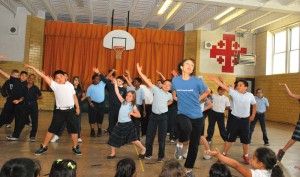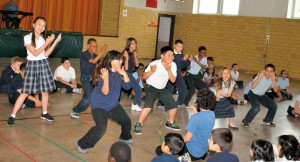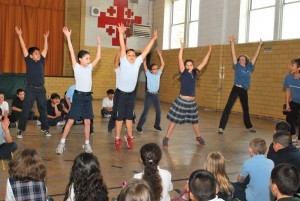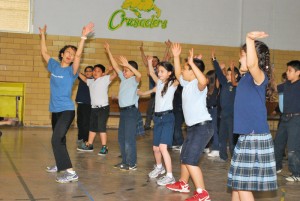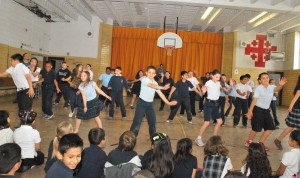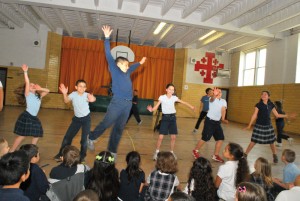BY LESLIE COLLINS
Northeast News
June 5, 2013
As the Holy Cross Catholic School fourth graders lined up in the gym, they couldn’t stop from smiling. They were ready to dance.
Their gusto felt contagious as they executed their choreographed moves to the live keyboardist, keeping in time to the music and chanting simultaneously. During one dance sequence they shouted the ways to be excellent in life, which included “work hard, do your personal best and never give up.”
Their May 8 dance performance was part of the pilot program “Take the Stage,” which is based on the National Dance Institute of New York teaching methodology.
“It’s founded on the belief that the arts have the capacity to inspire and motivate children,” said Rebka Sakati, artistic director of Take the Stage. “So, we are in schools taking high quality dance education to populations that might not otherwise have the opportunity to study the arts.”
Sakati said the program uses music and dance to teach anti-bullying messages, basic life skills and how to be excellent in life. It also incorporates fourth grade curriculum. For one number, the youngsters used a singsong voice and dance moves to illustrate the cultures and customs of several countries from around the world.
Not only did the dancing complement the school’s curriculum, it also exposed Holy Cross students to the arts, said Holy Cross Principal Jean Ferrara.
“Dance lessons are almost impossible for people in a low income demographic,” Ferrara said. “It takes money and commitment.”
In some of the Holy Cross households, each parent works two jobs, she said.
“It’s been moving and very powerful to see the children’s reception,” Sakati said. “This is something that works just as well for boys and girls. It’s not ballet. It’s very pedestrian movement, very accessible to them.”
The group of fourth graders included both low and high learners, Ferrara said.
“They were all so proud of themselves; they loved it,” Ferrara said of the fourth graders. “It’s a great learning initiative for these kids.”
It engaged their brains, forced them to think visually, musically and provided physical activity, she said.
“This was high cognition,” Ferrara continued. “You had to be thinking to do this well. You had to watch and listen to do this well… There was every kind of kid in that group of kids and they were functioning like one. For the principal, that was a home run.”
One teacher told Sakati that the program helped the students connect with one another; they learned to work as a team.
One student wrote in the end evaluation: “It helped me not be afraid and helped me understand I can be my own person and helped me understand that others are like me in a way.”
When the students first learned about the dance program, they weren’t keen on the idea and doubted they could perfect the choreography. Sakati met with the students once a week for 50 minutes from March through May and noted how their attitudes changed. They learned to take positive risks and learned they could accomplish something they never thought possible.
“She made them not just believe they were dancers, but they were good dancers and could really do it together and impress people,” Ferrara said. “It worked out to be wonderful.”
In addition to teaching students at Holy Cross, Sakati also met with students at Our Lady of Angels as part of the pilot program, which is sponsored by the Owen/Cox Dance Group. Sakati’s goal is to expand the program throughout the Kansas City metro and into rural areas. She also wants to provide an outlet for students to continue to hone their dancing skills if they so choose and provide avenues to perform. She’d also like to incorporate more local history into the lessons, like the history of Kansas City jazz and partner with organizations like the American Jazz Museum. She envisions the students could take a field trip to the museum and perform there.
A former member of the Kansas City Ballet, Sakati has been dancing since the age of five and has performed professionally for 20 years.
“I think what drew me to it (dance) is that I was able to become someone totally other (than myself); I could completely be creative… I just fell in love with an open door of possibilities of what movement could be. It’s just a part of me. I can’t imagine doing anything else.”
Asked what she hopes the students take away from the program, she said, “I hope they take away a sense of empowerment, to believe in themselves. I think that’s critical. It’s critical that they are confident and that they go forth and make the most of their lives. I don’t want them to be held back by self-doubt or worry.”
“Take the Stage” is more than a name, it’s a concept, she said.
“It’s understanding that life is your stage,” Sakati said. “If you work hard and believe in yourself, then you can take life’s stage. You can take life on and be successful.”
Funding and underwriters are needed to continue the program. Volunteers are also welcome. For more information about Take the Stage and how to help, email Rebka Sakati at takethestagekc@gmail.com or visit www.owencoxdance.org and click on the “Education” link.


